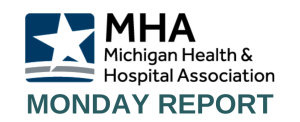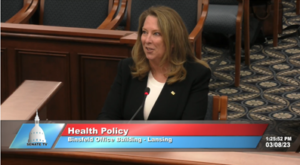
 Supplemental Signed into Law, MHA Provides Additional Testimony
Supplemental Signed into Law, MHA Provides Additional Testimony
Governor Gretchen Whitmer signed a supplemental appropriation bill on March 8 that includes $75 million for hospital recruitment, retention and training of healthcare workers. The funding was included as a part of House Bill 4016 …
MyMichigan Medical Center Alpena Nurse Receives Q1 MHA Keystone Center Speak-up! Award
The MHA Keystone Center presented Laura Smith, RN at MyMichigan Medical Center Alpena, with the quarterly MHA Keystone Center Speak-up! Award, which celebrates individuals or teams in Michigan hospitals demonstrating a commitment to the prevention …
Webinar Outlines Considerations for the End of the Public Health Emergency
The Department of Health and Human Services COVID-19 public health emergency expires May 11, 2023, which may significantly decrease the flexibility providers have become accustomed to. The MHA will host The End of the …
MDHHS Candida auris Patient Transfer Recommendations
Candida auris cases have been reported in multiple healthcare facilities in Michigan, including acute care hospitals, long-term acute care hospitals and skilled nursing facilities. Auris is a yeast pathogen that can cause serious …
 MHA Podcast Covers Patient Safety Awareness Week feat. The MHA Keystone Center
MHA Podcast Covers Patient Safety Awareness Week feat. The MHA Keystone Center
The MHA released another episode of the MiCare Champion Cast, which features interviews with healthcare policy experts in Michigan on key issues that impact healthcare and the health of communities. On episode 27, Adam Novak, …
Resources, Webinars Available for Navigating Medicaid Eligibility Changes
The Michigan Department of Health and Human Services recently released a final policy bulletin informing providers that Medicaid eligibility redeterminations will resume in June 2023 for the first time since early 2020, with some …
 Applications Open for Excellence in Governance Fellowship, Prepares Trustees to Lead
Applications Open for Excellence in Governance Fellowship, Prepares Trustees to Lead
The MHA Excellence in Governance Fellowship is now available to healthcare board members looking for innovative, effective ways to lead their organizations as hospitals and health systems navigate financial strain and labor challenges. Applications are …
Governance Webinar Series Helps Trustees Advocate on Important Issues
Every board member must have a common understanding of critical issues, the implications for the hospital or health system and how to share the impact with government and community leaders. Without support, it is difficult …
Deadline Approaching for Early Sponsorship Commitment
The deadline to be featured as a sponsor of the MHA Annual Membership Meeting brochure, which is shared with hospital and health system CEOs, is March 17. The MHA’s sponsors are vital to helping conference …
News to Know
Registration is now open for the MHA Keystone Center Safe Patient Handling Conference.
 MHA in the News
MHA in the News
The MHA received media coverage the week of March 6 regarding Gov. Whitmer signing House Bill 4016, which will appropriate $75 million for the recruitment, retention and training of hospitals workers. Below is a collection …

 Supplemental Signed into Law, MHA Provides Additional Testimony
Supplemental Signed into Law, MHA Provides Additional Testimony MHA Podcast Covers Patient Safety Awareness Week feat. The MHA Keystone Center
MHA Podcast Covers Patient Safety Awareness Week feat. The MHA Keystone Center Applications Open for Excellence in Governance Fellowship, Prepares Trustees to Lead
Applications Open for Excellence in Governance Fellowship, Prepares Trustees to Lead MHA in the News
MHA in the News